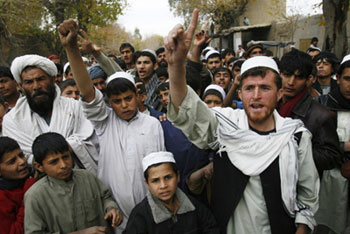(lead article)
U.S. general: Afghan
war to get more violent
Will use more drones, special forces

|
|
AP Photo/Rahmat Gul
|
|
Villagers shout anti-U.S. and anti-Afghan government slogans during funeral for people killed in December 7 attack by U.S. soldiers in Mehtar Lam, Afghanistan. |
BY SETH GALINSKY
December 16—The eight-year U.S.-led imperialist war in Afghanistan will become "more violent than has been the case in the past," said Washington's top general in the Middle East and Central Asia, Gen. David Petraeus, while defending President Barack Obama’s decision to send at least 30,000 more U.S. troops there.
Petraeus heads the U.S. military's Central Command and oversees the wars in Afghanistan and Iraq. He led the U.S. and other imperialist forces when the George W. Bush administration bolstered U.S. forces in Baghdad and western Iraq in what has become known as the surge. “This will be a longer and harder fight” than in Iraq, Petraeus told the Wall Street Journal December 10.
Petraeus, like other White House and Pentagon officials, has been emphasizing that there is “no time line” on ending escalation of the U.S. war there. Secretary of State Hillary Clinton said December 6, “We’re not talking about an exit strategy.”
The first new troops, a battalion of Marines, will arrive in Afghanistan this week. By April the number will grow to 17,000, said Secretary of Defense Robert Gates.
By the time all 30,000 troops are in place, including some 38,000 NATO soldiers, there will be about 136,000 in the country—greater than the 110,000 Soviet soldiers at the peak of the 1979 to 1989 failed Soviet occupation of Afghanistan.
Brig. Gen. Eric Tremblay, spokesman for NATO in Afghanistan, said that “an increase in tempo could lead to increased collateral damages.” Collateral damages is military jargon for “unintended” damage or deaths, usually of civilians.
More than 1,000 civilians were killed in Afghanistan in the first six months of 2009, according to a UN report that blamed both the U.S.-led forces, the Taliban, and other insurgents for the deaths.
Along with the increased troops, Petraeus told the Senate Foreign Relations Committee that “additional mission force elements” would be sent to Afghanistan in the spring. This is a reference to stepped up missile attacks from aerial drones, more bombings from warplanes, and an increase in the use of Special Forces.
At a December 8 news conference in Kabul, Afghanistan president Hamid Karzai, with Gates standing by his side, said that Afghanistan would not be able to pay for its own security for 15 to 20 more years.
Afghan army not effective
Washington has expanded the size of the Afghan army and attempted, without much success, to turn it into an effective fighting force. It wants to increase the army from its current size of 95,000 to about 170,000 by July 2011.
According to the Washington Post, some weeks only 52,000 Afghan soldiers report for duty. Washington recently boosted pay to Afghan soldiers and police to try to increase morale and win new recruits.
In spite of NATO claims that 7,000 new troops from U.S. allies will be sent to bolster the U.S. escalation, few specific commitments have been announced.
London has pledged to send at least 500 more troops to join the 9,500 British troops there, the second largest NATO contingent in Afghanistan, many of them deployed in the areas of heaviest combat.
The governments of Australia, South Korea, Sweden, Georgia, Ukraine, Macedonia, and Montenegro, none of which are NATO members, pledged almost 2,000 troops. The Italian and Polish governments promised to send some 2,100 more.
But a combined total of 5,000 soldiers from Canada and the Netherlands are set to completely withdraw by 2011.
U.S. officials openly state that the goal of the war escalation is not to crush the Taliban but to “reverse the Taliban momentum” and “degrade the Taliban to levels manageable by the Afghan security forces.”
Gates: Taliban part of Afghan fabric
In a December 8 interview on NBC Today, Gates admitted that “the Taliban are a part of the political fabric of Afghanistan at this point at some level.” Pointing to success that Washington had in Iraq in drawing some elements of the armed insurgency there into the government, Gates added, “that’s how this kind of a conflict always ends, in some kind of a political accommodation.”
Washington’s goal is to win at least some Taliban fighters. Those they can’t win over are to be “killed, captured or run off,” according to Petraeus.
So far, Washington’s attempts to split the Taliban have not been very successful.
“We have nothing to offer these people,” said Haji Jan Mohammed, director of the Afghan government’s “reconciliation” program for insurgents in two provinces. “We promise them jobs but there are no jobs, and we promise them land but there is no land.”
Some Democrats have opposed the escalation of the war. Democratic senator Russell Feingold has said that no "more American lives should be risked for a war that no longer serves our most pressing national security interest."
Congresswoman Maxine Waters, a prominent liberal Black Democrat and Obama supporter, opposed sending more troops, complaining that Obama “did not provide sufficient details” on how Washington would “be able to withdraw from Afghanistan.”
Related articles:
U.S. gov’t seeks expansion of war by Pakistani army
| 


